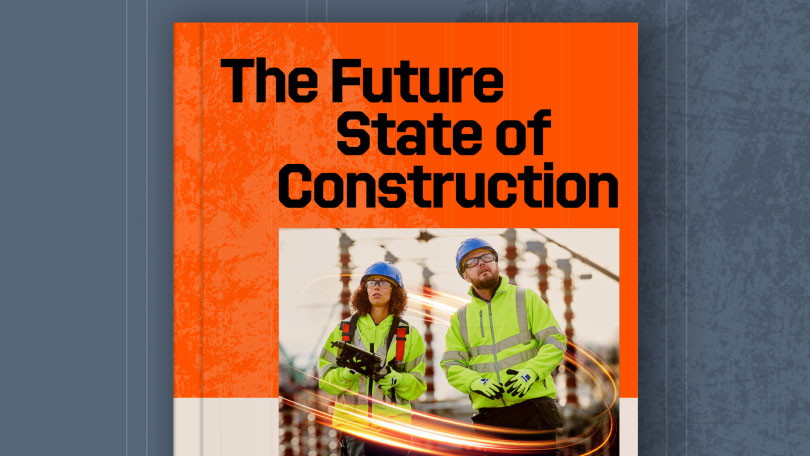— 6 min read
Construction Site Management

Last Updated Sep 15, 2025

Nicholas Dunbar
Content Manager
65 articles
Nick Dunbar oversees the creation and management of UK and Ireland educational content at Procore. Previously, he worked as a sustainability writer at the Building Research Establishment and served as a sustainability consultant within the built environment sector. Nick holds degrees in industrial sustainability and environmental sciences and lives in Camden, London.
Last Updated Sep 15, 2025

Construction sites are busy, dangerous environments that demand skilled management. To deliver projects safely, efficiently, and to high standards, professionals require strong construction site management skills. In the UK, this means combining technical expertise, leadership abilities, and a thorough understanding of local regulations.
This guide explores the fundamental principles of effective UK construction site management for construction professionals. These insights will help both experienced professionals and those seeking to advance their careers in this important field.
Table of contents
Understanding Construction Site Management
Construction site management involves overseeing and coordinating all construction site activities, resources, and personnel. The primary objective is straightforward: deliver projects successfully – on time, within budget, to the required quality standards, and with unwavering commitment to safety. This means transforming project plans into reality while managing daily operations and resolving challenges that arise on site.
However, effective site management demands more than technical skills alone. It requires strong leadership, clear communication, and a solid understanding of project management principles to ensure smooth operations.
Key Pillars of Successful Site Management
Effective construction site management relies on several interconnected areas. Each pillar plays a crucial role in determining a project's outcome:
Safety Management
Creating a secure working environment takes absolute priority on any construction site. This involves implementing robust safety systems, providing comprehensive training, and rigorously enforcing health and safety regulations, particularly those outlined in the Construction (Design and Management) Regulations 2015.
Time Management
Developing and adhering to realistic project schedules ensures timely completion. This requires careful planning, coordinating different trades, and closely monitoring progress against timelines to prevent costly delays.
Cost Management
Staying within budget presents an ongoing challenge. Successful site managers track expenses meticulously, manage resources efficiently, and identify potential cost overruns early to maintain financial control. More detailed information can be found in our guide to construction cost management.
Quality Management
Ensuring the finished project meets quality standards and client expectations remains essential. This involves implementing robust quality control measures, conducting regular inspections, and addressing any defects promptly.
Resource Management
Managing all resources, including workers, materials, and equipment, keeps projects running smoothly. This means having the right resources available at the right time and utilising them efficiently.
Communication
Clear and consistent communication amongst all stakeholders – clients, contractors, site workers, and suppliers – reduces misunderstandings and promotes collaboration.
Stakeholder Management
Building strong relationships with all parties, including clients, suppliers, local authorities, and the local community, facilitates smooth project delivery and manages expectations effectively.
Risk Management
Identifying potential risks early – whether related to safety, schedule, cost, or quality – and developing robust mitigation strategies helps minimise problems and protect project success.
Key Roles & Responsibilities
A safe, successful construction site operates as a team effort, with clearly defined roles and responsibilities:
Construction Site Manager
This team member is the central figure, overseeing all aspects of the construction site. This includes safety, time, cost, quality, and resource management while ensuring the project follows plans and regulations.
Assistant Site Manager
This role supports the site manager by helping with tasks such as site supervision, material procurement, and monitoring daily progress.
Supervisors
These professionals oversee specific trades or work areas, ensuring tasks meet specifications, quality standards, and most importantly, all safety requirements.
Tradespeople and Workers
These hands-on professionals carry out the actual construction work and must strictly follow safety protocols and quality standards.
Project Manager
The project manager typically oversees the project from an office or strategic level, handling planning, budgeting, and contract management while working closely with the site manager to achieve project goals.
Benefits of Effective Site Management
Strong site management practices deliver significant advantages:
Reduced Costs
Effective management minimises waste, reduces delays, and helps control expenses, resulting in substantial savings throughout the project lifecycle.
Increased Productivity
Better planning, coordination, and resource utilisation lead to higher overall productivity and efficiency. This helps to complete projects faster without compromising quality.
Improved Safety
Focusing on safety through proper procedures, training, and enforcement significantly reduces accidents and injuries, creating a safer and more compliant work environment.
Higher Quality Outcomes
Adhering to quality standards and conducting regular inspections ensures the final product meets or exceeds client expectations, resulting in greater client satisfaction.
Enhanced Communication
Clear and consistent communication amongst all stakeholders minimises misunderstandings, resolves issues quickly, and promotes smoother project delivery.
Positive Reputation
Managing projects effectively, with a strong focus on safety, quality, and efficiency, builds a contractor's reputation. This leads to increased trust and future opportunities.
Construction Site Management Plan & Construction Phase Plan
A Construction Site Management Plan (CSMP) is a comprehensive document that outlines how a construction project will be set up, managed, and controlled to ensure successful and safe completion. It provides a detailed guide for all stakeholders, covering numerous aspects from planning through to completion.
Key CSMP elements typically include:
- Project overview (objectives, scope)
- Site information (location, size, neighbouring properties)
- Health and safety procedures (emergency response, training)
- Environmental considerations (waste management, pollution control)
- Quality control standards and procedures
- Stakeholder management (communication protocols)
- Resource management (materials, equipment, personnel)
- Scheduling and logistics (timelines, work sequences)
- Risk management (identification and mitigation strategies)
- Compliance (adherence to relevant legislation and planning conditions)
In the UK, it's important to distinguish between the CSMP and the Construction Phase Plan (CPP). The CPP represents a specific document legally required under the CDM Regulations 2015. It demonstrates how health and safety risks will be managed during a project's construction phase. While a CSMP serves as a broader management document, the CPP constitutes the legally mandated health and safety component, outlining how the project will be delivered safely.
Navigating UK Construction Regulations & Career Paths
Working in UK construction site management requires a thorough understanding of the regulatory landscape. The CDM Regulations 2015 play a central role, placing duties on clients, designers, and contractors to plan, manage, and monitor health and safety throughout the project lifecycle. Meanwhile, the Health and Safety Executive (HSE) is the primary body establishing regulations, providing guidance, and ensuring compliance.
For those seeking to advance in site management roles, qualifications are essential. The NVQ Level 6 in Construction Site Management represents a highly regarded vocational qualification, often considered equivalent to a Bachelor's degree, demonstrating competence in managing construction projects. Other important qualifications include HNC/HNDs and degrees in Construction Management. Additionally, organisations such as the Chartered Institute of Building (CIOB) and the Construction Industry Training Board (CITB) offer valuable resources, training, and professional recognition.
Salaries for construction site managers in the UK vary based on experience, project size, and location, but typically reflect the significant responsibility of the role.
Technology and Modern Challenges
Modern construction site management increasingly embraces technology solutions. Building Information Modelling (BIM), project management software, digital safety platforms, and even drones for site monitoring are transforming how sites operate. These innovations enhance efficiency, communication, and safety outcomes.
Despite technological advances, UK construction sites face common challenges, including fluctuating material costs, supply chain disruptions, adverse weather conditions, and skilled labour shortages. Successful site managers quickly identify these issues, implement robust contingency plans, and adapt strategies to keep projects on track.
In Summary
Effective construction site management drives successful project delivery in the UK. Mastering the fundamental pillars of safety, time, cost, quality, resource, communication, stakeholder, and risk management enables professionals to lay the foundation for success. Combined with a thorough understanding of UK regulations, this expertise ensures projects complete to the highest standards, safely and efficiently.
Written by

Nicholas Dunbar
Content Manager | Procore
65 articles
Nick Dunbar oversees the creation and management of UK and Ireland educational content at Procore. Previously, he worked as a sustainability writer at the Building Research Establishment and served as a sustainability consultant within the built environment sector. Nick holds degrees in industrial sustainability and environmental sciences and lives in Camden, London.
View profileExplore more helpful resources

Integrated Compliance: A Main Contractor’s Guide to ISO 9001, 14001, 45001, and 44001
For UK main contractors, ISO 9001, 14001, and 45001 are fundamental prerequisites to any tendering activity. The Building Safety Act, Net Zero targets, and tight margins mean these certifications are...

The Main Contractor’s Action Plan for Commercial Risk
For UK main contractors, managing risk protects project margins, rather than solely acting as a compliance exercise. Construction is an industry defined by thin profits and high liability, and a...

Construction Action Plans: Minimising Risk & Maximising Delivery
A construction project is a complex set of tasks, resources, and stakeholders. Without a clear, documented path forward, even meticulous planning can lead to delays, cost overruns, and disputes. The...

Construction Drawings: Guide to Types & Regulations
While architects, urban planners and landscape designers first conceive buildings and public realms in their minds, translating vision into detailed drawings remains the foundation for any project. Construction drawings translate...
